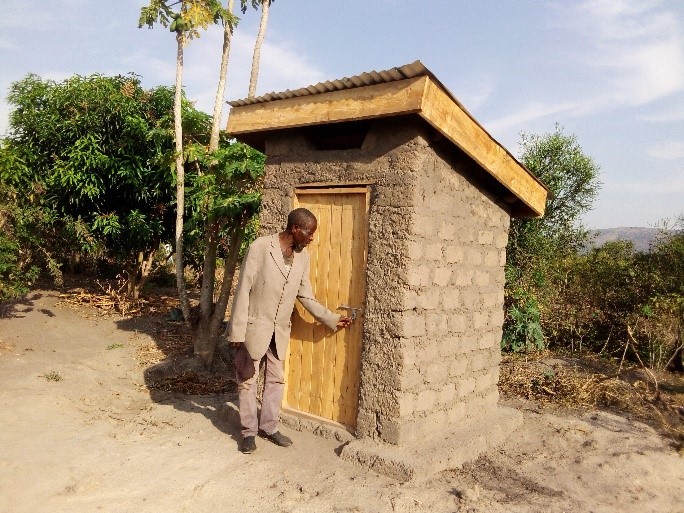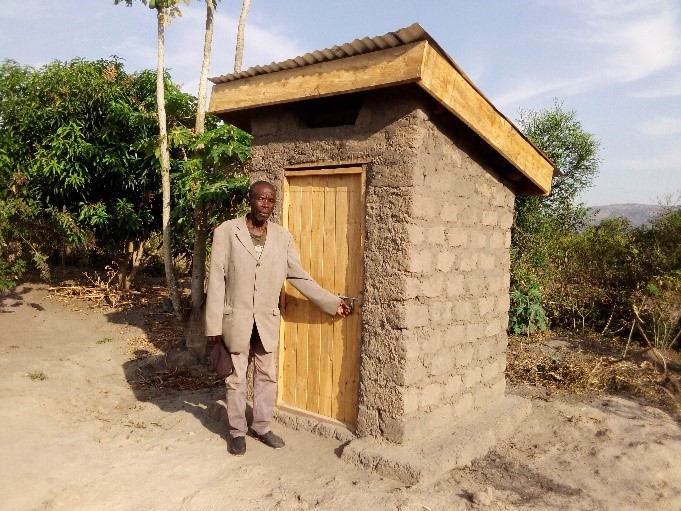HIJRA’s Interventions transforms lives in Nakivale and Oruchinga settlements
-
by
hijradmin
- No Comments on HIJRA’s Interventions transforms lives in Nakivale and Oruchinga settlements
Bondwe Kissa is a 68 year Congolese refugee who has been registered as a Person with Special Needs (PSN). He was granted refugee status in January 2012 and has been living in Rurongo C in Rurongo zone in Oruchinga settlement, Isingiro district.
He fled Congo after conflict broke out between different rebel groups and arrived at the settlement reception center where he was received by representatives from Office of the Prime Minister and settled in a plot where he constructed a temporary shelter. Later in 2018, HIJRA constructed a PSN house with a latrine for him. Unfortunately, due to heavy rain experienced at the settlement the pit latrine collapsed.
Mr Kissa recounts “I spent 3 years without a latrine to relieve myself. I would use neighbors’ latrine or I would defecate in the open in different parts of my plot. “Personally, I was unable to build a latrine because of chronic illness and age ever since my latrine collapsed”.
In 2023 Mr. Kissa was identified during a hygiene and sanitation sensitization meeting by community members to benefit from latrine construction. After few days, HIJRA’s Water Sanitation and Hygiene (WASH) team conducted an assessment and pledged to construct a PSN dome shaped slab latrine for Mr.Kizza. The dome shaped pit latrine was duly constructed with the help of youth from the settlement, and since then has benefitted the whole community who no longer practice open defecation.
This is one of many WASH interventions HIJRA has undertaken in refugee settlements and transit centers. HIJRA’s approach to WASH in emergencies focuses on providing WASH services in the refugee settlements in the Southwest by those affected by armed conflict, migration crises, and diseases like cholera, Ebola and COVID-19. The organization’s initial interventions in Uganda was in the WASH sector at Matanda Transit Center in 2012 and expanded its services to the management of Nyakabande and Bubukwanga Transit Centers.
Anohter example is community and school based sanitation and hygiene programs that have been conducted in selected villages of Oruchinga and Nakivale. This is done through monthly community meetings and quarterly community level meeting to increase awareness on the importance of proper hygiene, establishing rubbish pits,tippy taps with clean water ,bathing shelters, kitchens, drying racks and lines for hanging clothes
As a result the settlement residents are way more aware about the importance of cleanliness and maintenance of hygiene.
“People are conscious now” says Mr. Kisa.
HIJRA’s WASH interventions in Oruchinga are particularly notable. Before HIJRA commenced operations in the settlement in 2012, the residents lacked the essentials such as clean water and decent toilets. There was one water point and refugees would walk long distances and queue for long to collect water. This is no longer the case today.
Mr. Kisa shared how the water situation has improved, “We now have water supply close to our home. It has been a big relief. We do not have to walk far to collect water or stand in long queues.”. Access to water and toilets has provided the community with more time to learn, work and pursue income generating activities
Menstrual periods no longer a challenge
Another intervention undertaken by HIJRA is the promotion of menstrual hygiene management through training of girls, boys, teachers and parents and supporting them to make reusable sanitary pads. Menstruation is one of the challenges that keeps adolescent girls out of school. In the refugee settlements, many drop out of school, some miss school, while in some communities, the onset of menstruation signifies marriage.
While menstruation is a natural part of growing up for girls, the first menstrual period is a surprise for many. Refugee girls in the settlements of Nakivale and Oruchinga are not any different, they too lacked accurate information and knowledge about menstruation. However, through the HIJRA-supported school sensitization program, the girls are being educated about their menstruation for them to learn how to manage their periods.
The menstrual hygiene management activities by schools are among the interventions supported by HIJRA to address challenges that impact enrolment retention and completion of education for girls.
Girls, boys, teachers and parents were taken through steps of how to make the pads, how to maintain the pads, how to help/counsel a person who is in menstruation periods, things required during menstruation, and signs of menstruation.
One of the most important changes girls go through is menstruation. Therefore, providing them with the necessary information about menstruation will empower them overcomes challenges presented by this stage in their lives
“ I spent 3 years without a latrine to relieve myself. I would use neighbors’ latrine or I would defecate in the open in different parts of my plot. Personally, I was unable to build a latrine because of chronic illness and age ever since my latrine collapsed ”
Mr Kissa


